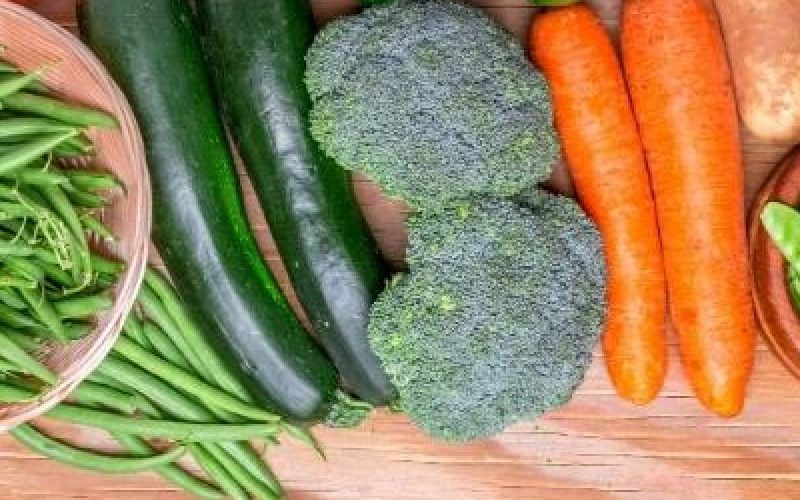Among the best ways for individuals to improve their health and well-being is to consume plenty of vegetables.
All vegetables contain vitamins, minerals and fibre, which are healthy. Nonetheless, some stand out for their extraordinary health advantages.
Certain people benefit more from some vegetables than others based on their diet, general health and nutritional requirements.
Here in this article, we list 14 of the healthiest vegetables in the world;
1. Spinach
This leafy green tops the list as one of the healthiest vegetables thanks to its excellent nutritional content.
One cup (30 grams) of raw spinach offers 56 percent of your daily vitamin A needs together with your entire everyday vitamin K requirement all for just seven calories. Spinach also has several antioxidants that can help reduce the risk of chronic illness.
One study showed that dark green leafy vegetables such as spinach are high in beta-carotene and lutein, two forms of antioxidants that have been linked with a minimized risk of cancer.
Furthermore, a study in 2015 revealed that spinach intake could be beneficial for heart health, as it can lower blood pressure.
2. Carrots
Carrots are filled with vitamin A, offering 42.8 per cent in only one cup (128 grams) of the daily recommended amount. They contain beta-carotene, an antioxidant that gives carrots their bright orange colour.
This antioxidant may also help prevent cancer. One study found that for each portion of carrots, a week participants risk of prostate cancer decreases by 5 per cent.
Another research found that the risk of lung cancer in smokers could also be decreased by consuming carrots.
Smokers who did not consume carrots had a three times greater chance of developing lung cancer compared to the one who consumed carrots at least once per week.
Carrots also contain a high content of vitamin C, vitamin K and potassium.
3. Broccoli
Broccoli belongs to the cruciferous family of vegetables. It is abundant in a plant compound (that contains sulfur) that is known as glucosinolate, and sulforaphane, a glucosinolate by-product. Sulforaphane is vital in that it has been shown to have a cancer-protective effect.
In one animal study, sulforaphane decreased the number and size of breast cancer cells while also preventing tumour growth in mice.
Consuming broccoli can help prevent other forms of chronic disease, as well.
A 2010 animal study found that eating broccoli sprouts could help defend the heart from disease-causing oxidative stress by dramatically reducing oxidant levels.
Broccoli is also filled with nutrients, in addition to its ability to avoid diseases.
A cup (91 grams) of raw broccoli provides 11.6 per cent of the daily vitamin K requirements, 13.5 per cent of the daily vitamin C requirement, and a decent amount of folate, manganese, and potassium.
4. Garlic
Garlic has a long history of use as a medicinal herb with roots dating back to ancient China and Egypt.
Allicin, a plant compound which is primarily responsible for garlic’s range of health benefits, is the key compound present in garlic. Many studies have demonstrated that garlic can stabilize blood sugar and promote the health of the heart.
In one animal study, diabetic rats were given either garlic oil or diallyl trisulfide, a garlic product. The two garlic compounds caused a drop in blood sugar and increased insulin levels.
In another study, participants both with and without heart disease were fed garlic. The result revealed that garlic in both groups was able to minimize overall blood cholesterol, triglycerides and LDL cholesterol while boosting HDL cholesterol.
Garlic can also be important in cancer prevention. One test-tube research showed that in human liver cancer cells, allicin caused cell death. Nonetheless, more research is required to understand the possible anti-cancer effects of garlic fully.
5. Brussels sprouts
Just like broccoli, brussels sprouts are part of the cruciferous vegetable family and contain the same plant compounds that promote health.
Kaempferol, an antioxidant that may be especially effective in preventing cell damage, is also found in Brussels sprouts.
In one animal study, kaempferol was found to protect against free radicals that trigger oxidative cell damage and can lead to chronic disease.
The intake of Brussels sprouts can also help improve detoxification.
One study found that consuming Brussels sprouts caused some of the particular enzymes that regulate detoxification to increase by 15 – 30 per cent, which may minimize the risk of colorectal cancer.
Furthermore, brussels sprouts are very nutrient-dense. A good number of vitamins and minerals are given for each portion that includes vitamin K, vitamin A, vitamin C, folate, manganese and potassium.
6. Kale
Kale is well-known, like other leafy greens, for its health-promoting properties, as well as its nutritional quality and antioxidant content.
There are plenty of B vitamins, potassium, calcium and copper in a cup (67 grams) of raw kale. It also fulfils your entire daily vitamin A, C and K requirements.
Kale may also help enhance heart health owing to its large amount of antioxidants.
In a 2008 study, 32 people with high cholesterol drank 150 ml of kale juice regularly for 12 weeks. By the end of the study, HDL cholesterol increased by 27 per cent, LDL cholesterol decreased by 10 per cent and antioxidant activity was improved.
A further study revealed that drinking kale juice could reduce blood pressure and may be useful in reducing both blood cholesterol and blood sugar.
7. Swiss chard
Swiss chard has a low calories content but high in many vitamins and minerals that are essential. A cup (36g) contains only seven calories m, 1 gram of fibre, 1 gram of protein and lot of vitamins A, C and K, manganese and magnesium.
In particular, Swiss chard is known for its ability to prevent harm caused by diabetes mellitus.
In one animal study, chard extracts have been reported to alleviate the symptoms of diabetes by reducing the levels of blood sugar and inhibiting disease-causing free radicals from cell damage.
Other animal studies have found that the antioxidant content of chard extract can help defend the liver and kidneys against the adverse effects of diabetes.
8. Green peas
Peas are considered to be starchy vegetables. This implies that they have a high amount of carbohydrates and calories than non-starchy vegetables, and they can affect blood sugar levels when consumed in large quantities. Nonetheless, green peas are unbelievably nutritious.
There are 9 grams of fibre, 9 grams of protein and vitamins A, C and K, riboflavin, thiamin, niacin and folate in one cup (160 grams) of cooked green peas.
Peas promote digestive health by improving the good gut bacteria and encouraging daily bowel movements because they are high in fibre.
In addition, peas are rich in saponins, a group of plant chemicals recognized for their anti-cancer effects.
Evidence found that saponins can help treat cancer by preventing tumour growth and triggering cell death in cancer cells.
9. Ginger
Ginger root is usually used as a seasoning in everything from vegetable dishes to desserts. Traditionally, ginger is often used as a possible cure for motion sickness.
The beneficial effects of ginger on nausea have been reported in many studies. Ginger significantly decreased nausea compared to placebo in a study consisting of 12 trials and almost 1,300 pregnant women.
Ginger has strong anti-inflammatory properties that can be effective in treating conditions such as arthritis, lupus or gout due to inflammation.
In one study, osteoarthritis patients treated with a concentrated ginger extract observed decreased pain in their knees and recovery from other symptoms.
Further research indicates that ginger may also assist in the treatment of diabetes. A 2015 study examined the effects of diabetes with ginger supplements.
After 12 weeks, ginger was found to be successful in reducing blood sugar levels.
10. Asparagus
This spring vegetable is rich in many vitamins and minerals, making it an ideal addition to any diet.
Just 1/2 cup (90 grams) of asparagus offers one-third of the daily requirements for folate. This quantity also provides lots of selenium, vitamin K, thiamin and riboflavin.
Having sufficient folate from sources such as asparagus can provide disease protection and can eliminate genetic disorders in the neural tube during pregnancy.
A few test-tube studies have demonstrated that asparagus can help the liver by promoting its metabolic function and safeguarding it against toxicity.
11. Red cabbage
This crop belongs to the cruciferous vegetable family, and it’s brimming with antioxidants as well as health-promoting properties.
One cup of raw red cabbage (89 grams) contains 2 grams of fibre and 85 per cent of the daily requirement for vitamin C.
Red cabbage is also rich in anthocyanins, a category of plant compounds that contribute to its specific colour as well as a whole host of medical benefits.
A diet intended to boost cholesterol levels and increase plaque accumulation in the arteries was fed to rats in a 2012 animal study. The red cabbage extract was then supplied to the rats.
The study concluded that red cabbage extract was capable of preventing blood cholesterol levels from rising and protecting against heart and liver damage.
Another animal study followed these findings in 2014 that revealed that red cabbage could minimize inflammation and prevent liver problems in rats fed a high-cholesterol diet.
12. Sweet potatoes
Sweet potatoes, categorized as a root vegetable, stand out for their bright orange colour, sweet taste and amazing health advantages. 4 grams of fibre, 2 grams of protein and a considerable amount of vitamin C, vitamin B6, potassium and manganese are found in one medium sweet potato.
It’s also high in a type of beta-carotene called vitamin A. Typically, 43.8 per cent of your daily vitamin A needs are fulfilled by one sweet potato.
A substantial reduction in the risk of some forms of cancer, including lung and breast cancer, has been associated with the intake of beta-carotene.
Additional benefits can also be found in several sweet potato varieties. For instance, caiapo is a type of white sweet potato that may have an anti-diabetic impact.
In one study, 4 grams of Caiapo regularly were offered to diabetes patients for 12 weeks.
This led to a decrease in both blood sugar and blood cholesterol levels.
13. Greens collard
Collard greens are a vegetable which is very rich in nutrient. Five grams of fibre, 4 grams of protein and 27 per cent of your daily calcium requirements are contained in one cup (190 grams) of cooked collard greens.
Collard greens are among the best natural sources of calcium available together with the other green vegetables like broccoli and soybeans.
Sufficient calcium consumption from plant sources can improve bone health, and the risk of osteoporosis has been shown to lessen.
Also, collard greens are rich in antioxidants and may also reduce the risk of contracting certain diseases.
One study showed that a 57 per cent reduced risk of glaucoma, an eye disease that can cause blindness, was linked with consuming more than one portion of collard greens a week.
Another study revealed that high consumption of vegetables such as collard greens might reduce the risk of prostate cancer.
14. Kohlrabi
Kohlrabi also referred to as turnip cabbage or German turnip is a cabbage-related vegetable that can be eaten raw or fried.
Raw kohlrabi is rich in fibre, containing 5 grams (135 grams) in each cup. It is also full of vitamin C, offering a daily amount of 140 per cent per cup.
Researches have demonstrated that it is an effective weapon against inflammation and diabetes because of the antioxidant content of kohlrabi.
In animal research, kohlrabi extract was able to reduce blood sugar levels by 64 per cent within just seven days of treatment.
Although there are different types of kohlrabi accessible, studies show that red kohlrabi has almost double the number of phenolic antioxidants and shows greater anti-diabetic and anti-inflammatory effects.
Including vegetables in your diets is vital for good health from supplying essential vitamins and minerals to battling the disease.
Although the vegetables mentioned here have been thoroughly researched for their health benefits, there are many more vegetables that are perfect for your health as well.
Make sure that you get a nice blend of vegetables in your diet to take full advantage of their extensive health benefits.








